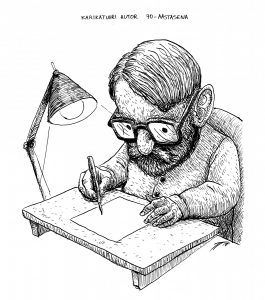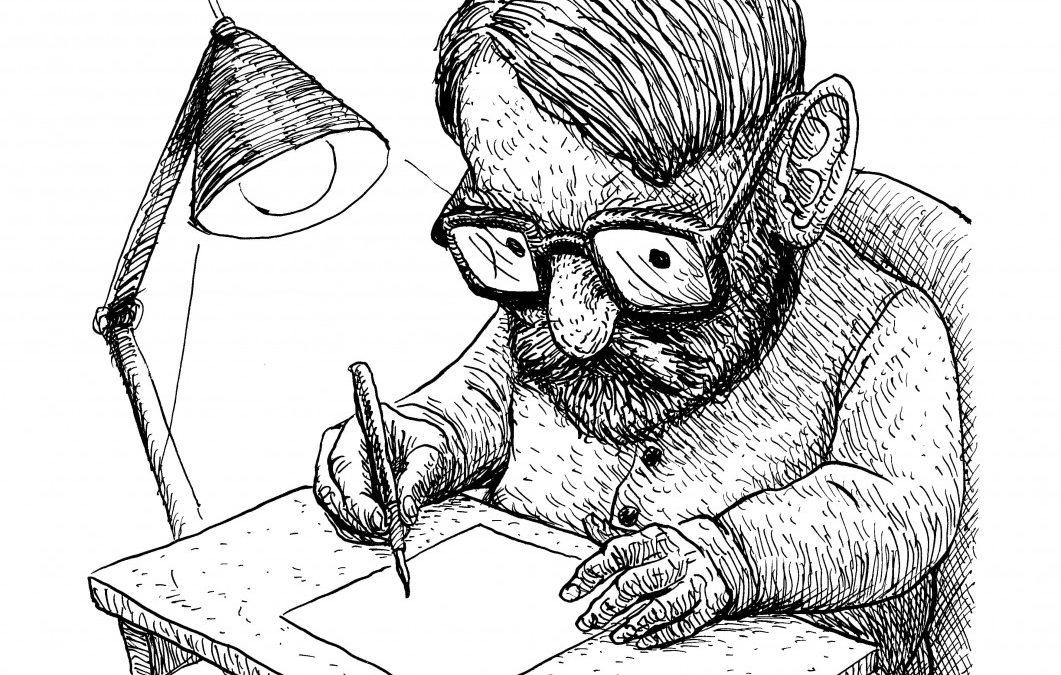Liisi Uder
Müürileht

Caricature: Toom Tragel
Public understanding of pension changes with their work, which in the future, more than ever before, will be based on personal responsibility, self-realisation needs and on lifelong learning and career models.
I am parting my hair down the middle – grey hair really suits me . A touch of lipstick, I grab my purse and off I go. In the first half of the day, I have meetings with clients, and later on I have a couple of evening meetings with young managers who I am coaching. Tomorrow is a day off, which means no work – I will take a walk with my dog in the forest and, as on all Tuesdays, I will help at the Food Bank with my friends.
This is my self-portrait from the future, when I am 73 years old. I am a pensioner according to today’s understanding. The term “pensioner” will have disappeared by that time because there will no longer be a specific age when people should retire or go on “holiday”, as many of us may know today. This does not mean abolishing the pension system, but people will get the right to make decisions and take responsibility for their own old age.
The state pension system will never be able to afford the old age we dream of. The calculations of the Ministry of Finance and the Ministry of Social Affairs show that if we do not make changes to the pension system now, in 2040 the average pension will be equivalent to 280 euros of today’s money. It currently stands at about 400 euros. The government, of course, is planning the reforms, but their implementation will only provide retention of the state pension at the same level. Everyone is free to decide whether it suits him/her or not. We must not forget that the pension of each person in the future will be more dependent on the wage earned during his/her life, which means that a large number of people will get a very small pension according to today’s standards.
In a situation when the number of elderly is increasing, and the number of young people is decreasing, the state cannot offer more. It is obvious in this case that people will have a need to receive money for living from other sources. Generally speaking, there are two such possibilities: to work longer and/or save money for old age.
Career-consultant Tiina Saar-Veelmaa wrote: “As the length of life increases, we all need to be prepared for the fact that when we become 90 years old and will want to “spark” (I know what I am talking about, as I have been a consultant for elderly people for three years), the length of an active life will increase. This, in turn, means that more self-realisation will be brought into our life”.
If elderly people living today perceive an increase in the working age as an unpleasant obligation, then the increase in the length of life can be perceived as an opportunity. However, of course, this will transpire only if we can keep ourselves in shape. Nowadays in Estonia, people are quite often compelled to retire before official retirement age due to health problems, but their knowledge/skills deteriorate, i.e. they find themselves unemployable. One of the biggest challenges for the state and every citizen is the question of how to live in such a way that could minimise such obstacles on the way to our self-realisation. Sometimes the changing world gives us a solution, but this is not always the case.
Researches and visionaries say that we will work very differently in the future compared to the past. The proportion of part-time and distance jobs will definitely increase, and no one will want to work all their life with the same employer doing one job. Such changes will not occur within ten years, but will definitely apply in 30-40 years. The younger generation will want to do the coolest things, and it often happens that these things are better paid. Doing these things is today called work. However, compared with real work, the benefit of doing the coolest things is that you want to do them all the time, even in old age. In fact, until death.
This means that the attitude of the younger generation to self-realisation is what will save us from talking about pensions in the future, because there is no time/period after work if there is no work in the first place. Among other things, this is what was pointed out by Kersti Kaljulaid, the President of the Republic of Estonia: “We will only succeed in the future if the vast majority of people – be they employers or employees, politicians or bureaucrats, old or young – will change their attitude towards health, educational work and retirement. There is no longer a linear sequence, but rather intertwined and often parallel steps”.
Therefore, the emerging generation will no longer work; they will do what they like. Is it enough to ensure their active life until old age? Yes and no. It is obvious that doing the things you like pushes you to learn more and more, and that is why you will not be behind the times in your knowledge/skills and thereby reduce your risk of becoming unemployable. “Maintaining up to date knowledge” is key in the XXI century because knowledge has never deteriorated as fast as in the current century. On the other hand, one-third of adult residents of Estonia have no specialised education (and there is no generational difference); this means that they have not yet developed the habit to learn, and it is difficult to compensate in adulthood for what was not formed at a young age. The statistics of lifelong learning shows that people over the age of 45 are half as likely to participate in lifelong learning compared with younger people.
The second prerequisite for a long working life is good health, which is probably not the kind of problem that will resolve itself. No matter how much we believe in the future of medicine, 50% of our health depends on personal choice (10% on medicine, 20% on genetics and 20% on environment). Naturally, one of the components of a long and qualitative life is taking healthy options; however, we should not forget that self-realisation at the cost of health is not viable, which is why you need to be demanding towards your working conditions.
The quality and enjoyment of life of an elderly (as, indeed, any other) person is mainly based on two pillars: self-fulfilment and security. As mentioned before, the state pension system will not be able to provide a larger income than it is now. At least once a year, SEB bank organises research on preparedness for retirement, which shows that people hope that their income during their retirement will compose about 90% of the last salary. The state pension system is able to cover only 40% of the salary; in this case, everyone should take care of the rest themselves.
I did simple calculations on how much a 25-year-old young person who earns an average salary would need to save each month if he wants to stop working at the age of 65 years and spend 90% of his average salary until the rest of his life. Men need to save 148 euros, while women 188 euros per month. If you start saving five years later, i.e. in your early thirties, then the monthly amount will be 174 and 216 euros respectively. Saving such large amounts seems to be utopian. Therefore, it is necessary to lower down your expectations of retirement income and not forget to save money. If we replace 90% with 50% in the formula, then men at the age of 25 should save 46 euros, and women – 33 euros per month (calculations are based on the average life expectancy of 25 and 30 year-olds, as well as the median gender wages). Is it feasible? I think yes, but …
Leonore Riitsalu, a lecturer of financial literacy in the University of Tartu, wrote the following in the blog Pension 2050: “Researchers of behavioural economics have found that people have difficulties making reasonable long-term decisions. It is easy to consider the real income we have today, but it is much more difficult to assess what you can afford for 100 euros deferred today in 20 years. It is more convenient not to take decisions that do not give quick outcome. /…/ It is also known that we are not always able to imagine ourselves being old. If you do not perceive a person who will wear your name in a couple of decades, then you will not have motivation to refuse something today in the name of his/her well-being”.
That is why I came up with #selfie2050. In order to understand that an active lady in the photo may be such only because she has already calculated how much she needs to save in order to live well in the future; she learns new things in order to make the learning process easier in 30 years, she analyses all her experiences in order to share it with others later on.
Imagine yourself taking a selfie. You will not see an old, sick and poor person in the photo, but a cheery, self-realised person. Save this image in your memory, and do everything to become the person depicted in the future.
